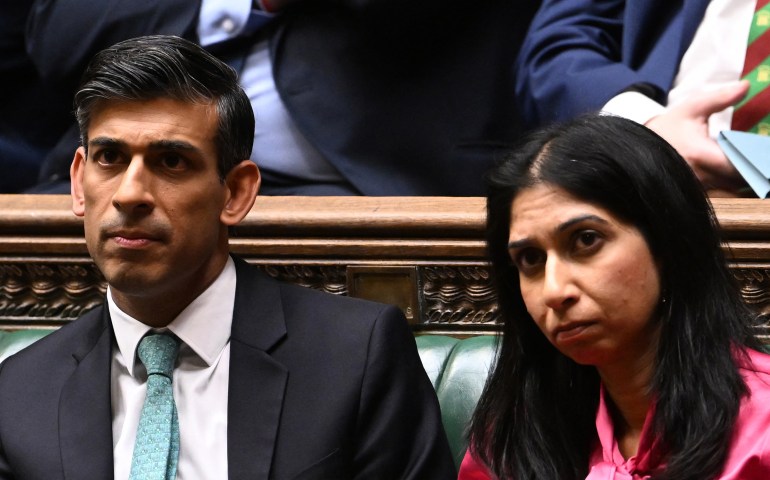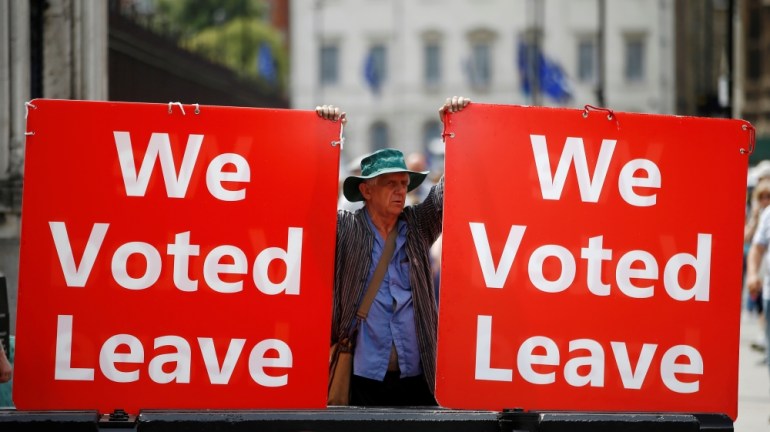London, United Kingdom – Net migration to the United Kingdom has hit a record at a time when the government is heavily focused on bringing the number of arrivals down.
Thank you for reading this post, don't forget to subscribe!The Office for National Statistics (ONS) reported last month that 606,000 people arrived in 2022, representing a 24 percent increase on the year before. In 2015, the year before the Brexit referendum, net migration stood at about 330,000.
Jay Lindop, director of the Centre for International Migration at the ONS, said the main drivers for last year’s increase were people coming to the UK from non-EU countries for work, study and humanitarian purposes, including those arriving from Ukraine and Hong Kong.
The latest figures sparked tensions within the ruling Conservative Party. Many right-wing politicians complained that their leader, Prime Minister Rishi Sunak, is failing to control borders.
Al Jazeera spoke to Nando Sigona, a social scientist and head of the Institute for Research into Superdiversity (IRiS) at the University of Birmingham, about migration flows, political wrangling and the need for foreign workers.

Al Jazeera: Are you surprised by the latest data on migration?
Nando Sigona: The increase is in line with a trend we had already detected before the pandemic where, despite the UK government’s anti-immigration rhetoric and the Brexit pledges of reducing immigration, overall net migration has been on an upward trend despite the decline of arrivals from the EU and the rise in EU citizens leaving the UK.
What I find important to highlight is the changing profile of those arriving and the overall worst conditions and rights they find themselves in.
Al Jazeera: British Prime Minster Rishi Sunak and Home Secretary Suella Braverman have argued that leaving the EU would allow the UK to control its borders. What impact has Brexit had?
Sigona: The impact of Brexit on the EU, the mobility from the European Union, has been significant. Starting from 2016, so from the referendum but especially since 2021 when Brexit was effectively implemented, all we see is that the number of EU citizens coming to Britain has been reduced hugely.
So Europeans are almost not coming to the UK any more.
What we also witnessed over the same period of time is that among those who were raised in the country, there’s been an increase in the number of people that are leaving. It’s not a mass exodus, but it’s clear what we see if you look at the data is that the net migration for all EU nationals is negative.
More Europeans are leaving the UK than coming in, and what’s happening now in terms of the other figure is that this affects every sector. So it’s not just economic migration but also international students.

Al Jazeera: Under new rules aimed at curbing immigration levels, foreign students have lost the right to bring their families to the UK. Will this really reduce the numbers?
Sigona: Fifty percent of international students come from China and India. When we talk about international students, we’re talking about between 450,000 to 500,000 people in the last year. It’s quite a sizeable number.
But those that bring their families are not a large part of that. It will have an effect, but not a huge one, not a significant one.
The government won’t manage to get [net migration] down to a few thousand people just working on this. But it really makes the UK a much less welcoming place for international students. The risk is that if you’re an international student, you would rather go to Australia, Canada or the US if they present a much more welcoming environment.
Al Jazeera: On the other side of the debate, many argue that Britain needs foreign workers, especially after Brexit and COVID-19.
Sigona: [Europeans] are not coming any more in larger numbers. The economy still needs additional workers, so this is why [the government has] increased the number of these work permits for people from outside the European Union. You need to find people somewhere.
Migrants coming in is a sign that the economy is attempting to recover. Migrants are really useful for the country. But my concern is that the living conditions for new migrants are much worse than they were before.
When European nationals came here to do a range of jobs, they were European citizens, and they were [part of the] European Union. That brought a lot of protections in terms of rights. They were treated better. They were treated like national workers.
[What] the new mechanism has created is very much more a second-class kind of worker, which are much more exploitable.
The government, particularly the people close to the prime minister and the treasurer, are well aware that we need migrant workers to get the country back at work.
Imagine the contributions of migrant workers after the Second World War to rebuild our essentials. You’re going to have to do that after COVID-19.
Al Jazeera: The Conservatives have been in power for more than 10 years. Where does the main opposition Labour Party stand on migration?
Sigona: They are playing the same game and saying, “Oh, you said you were reducing migration and you have failed.” They’re playing on the same conversation that the right of the Conservative Party is at the moment.
I really hope that in the near future, we will see mature and considered discussions around the importance of migration and the importance of considering strengthening the links with the European Union that will also facilitate the movement of workers between the UK and the rest of Europe.
This interview was lightly edited for clarity and brevity.

